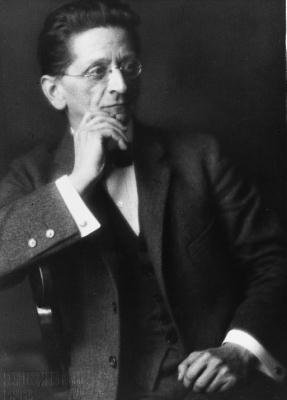 Alexander Zemlinsky is one of those B-list composers who may not get much play in the mainstream classical world. Fortunately, at the Temple of Reason known as the Library of Congress, there are people who devote their lives to musical archeology, and in fact their collection has a good number of important Zemlinsky sources. For the library's most recent free concert on Wednesday night, members of a newly formed group from Boston, Montage Music Society, gave a program of music by Zemlinsky and his more famous friend and brother-in-law, Arnold Schoenberg, inspired by the decadent, psychologically charged poetry of Richard Dehmel. The many empty seats were probably left unoccupied by people who feared such a program would consist of atonal and twelve-tone music, but the pieces performed sounded no more chromatic or dissonant than Richard Strauss.
Alexander Zemlinsky is one of those B-list composers who may not get much play in the mainstream classical world. Fortunately, at the Temple of Reason known as the Library of Congress, there are people who devote their lives to musical archeology, and in fact their collection has a good number of important Zemlinsky sources. For the library's most recent free concert on Wednesday night, members of a newly formed group from Boston, Montage Music Society, gave a program of music by Zemlinsky and his more famous friend and brother-in-law, Arnold Schoenberg, inspired by the decadent, psychologically charged poetry of Richard Dehmel. The many empty seats were probably left unoccupied by people who feared such a program would consist of atonal and twelve-tone music, but the pieces performed sounded no more chromatic or dissonant than Richard Strauss.Mezzo-soprano Janna Baty presented two sets of Dehmel songs, five by Zemlinsky and four by Schoenberg, with the group's pianist, Debra Ayers. The Zemlinsky songs were harmonically lush, teetering only occasionally on the chromatic edge, and most of the texts were not particularly shocking. Entbietung, about a man ordering a woman to prepare herself for an amorous night, pulsed with an ostinato figure in the piano accompaniment, the embodiment of a lustful obsession. Perhaps it was just this selection of songs, but Schoenberg, unlike his conservative colleague, seemed to have chosen much more controversial texts. At the end of Erwartung, a woman's pale hand beckons a man into their red villa, ushering in a smutty postlude of corrupt, extended harmony. In Schenk mir deinen goldenen Kahm, Jesus asks Mary Magdalen to give him her colden comb, her silken sponge, and her heart (gasp!).
Baty's powerful voice struck the necessary full-throated Straussian tone at the most demanding moments, like the booming ending of Erhebung, as the narrator's sense of self soars above the clouds toward the sun. The best song, however, was the more expressionistic Warnung, with many hints of the later, atonal Schoenberg. The narrator is a violent, abusive lover, violence incarnated in the jagged piano part. The voice concludes in wild shrieks, as the narrator remembers the dog he poisoned on behalf of the listener. "Du: denk an meinem Hund!" Baty's voice had impressive heft but in the few subtle, quiet moments in these sets, she was less sure.
Gail Wein, Montage Gives New Life To Zemlinsky's Cello Sonata (Washington Post, October 20) |
Only at the Library of Congress, can the violinist and cellist of a performing group be given Stradivari instruments to play, while a selection of scores and other materials relating to the music played in the concert can be shown in the lobby. (The Library of Congress owns major collections of both Schoenberg and Zemlinsky materials.) There were several letters from Zemlinsky to Schoenberg (all signed "Alex"), printed scores (Zemlinsky's Entbietung and Meeraugen and Schoenberg's Warnung), and manuscripts (including Schoenberg's copy of the original sextet version of Verklärte Nacht and Steuermann's arrangement).
I am so glad you went - I was not going to forgive myself for not having made it. At least SOMEONE heard Zemlinsky.
ReplyDelete